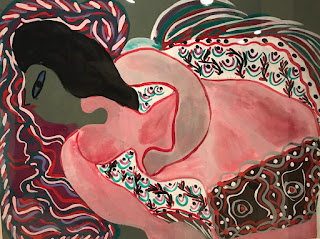 Just at the time when Jasmins bloom, most sweetly in the summer weather,
Just at the time when Jasmins bloom, most sweetly in the summer weather,Lost in the scented Jungle gloom, one sultry night we spent together
We, Love and Night, together blent, a Trinity of tranced content.
Yet, while your lips were wholly mine, to kiss, to drink from, to caress,
We heard some far-off faint distress; harsh drop of poison in sweet wine
Lessening the fulness of delight, - Some quivering note of human pain,
Which rose and fell and rose again, in plaintive sobs throughout the night,
Spoiling the perfumed, moonless hours
We spent among the Jasmin flowers.
In Arabic, Faiz means "Victorious" and Ulla(h) means "Of God." As such it seems that Faiz Ulla is a common male Arabic name. A search on YouTube for example reveals many men with Faiz Ullah or Faizullah as their name or incorporated into their name. Either way, in this poem Faiz Ulla is definitely "singing the blues."
It is reasonable to conclude that for Hope, either:
Faiz Ulla was an actual singer she overheard and transcribed or was inspired by
Or
Hope assigned the Faiz Ulla name to the poem wishing to evoke a "everyman" of mid to lower class status.
The poem starts well, in anticipation of a magical and deliciously dark moonless night of romance and love in a garden. The lovers commune as "We" with the personified and capitalized "Night" and "Love" (or Kama, Hope's "Indian Eros") to form a unified Trinity. The capitalization of the word Trinity elevates this communion to a high spiritual level. But the evocation of Christianity's highest doctrine seems odd in this poem sung by an Arabic and presumably Muslim male.
 The "victory of Allah" in this case would be the thwarting of this trysting "Trinity." The tryst becomes derailed because of the strange quivering moaning of a human in "suffering" - a victim of domestic violence? Or is it just a woman moaning in the throes of passionate sexual congress? It is honestly hard to make out the aim of this poem, except to illustrate that even in the most blissful state of union with the Beloved, it is possible to lose the mood.
The "victory of Allah" in this case would be the thwarting of this trysting "Trinity." The tryst becomes derailed because of the strange quivering moaning of a human in "suffering" - a victim of domestic violence? Or is it just a woman moaning in the throes of passionate sexual congress? It is honestly hard to make out the aim of this poem, except to illustrate that even in the most blissful state of union with the Beloved, it is possible to lose the mood. Is this derailing of a night of passion Allah's victory, as the name Faiz Ulla suggests, or just plain bad luck because you are a common Indian man seeking to make love out doors? Or is the poem a coded expression of the inevitable circumstances that Brits faced in India when couples were forced into close quarters with one another in dwellings, sometimes with thin walls or only curtains as dividers? With no private married quarters being allotted to men of low rank, it was certainly a common practice in the British army to move the wives and children of soldiers right into their husband's barracks, separated by a sheet. (See Sahib: The British Soldier In India, by Holmes)
 |
| By Fatma Haddad "Baya", 1947 |
If there is a more anticlimactic and plainly anti-erotic poem in all of Hope's catalogue, I have yet to see it. Faiz Ulla's sad fate is to remind us all to give thanks every time we meet Kama in all his delights in a comfortable place without the distractions of war, loss, human suffering or simply neighbors who are in close proximity - and more amorous than we are.
NOTE: "Song of Faiz Ulla" is recorded in the sixth section of India's Love Lyrics and may be listened to here. This is a sneak preview, and will not be available on Librivox until the entire book has been recorded.
21/3/18


No comments:
Post a Comment
Please feel free to share your thoughts, discussions, pleasures and corrections.